If a tool is developed to aid the production of software, its impact depends on the importance of the lifecycle phases it affects. Thus, a coding tool has the least impact while an evolution tool has the most impact.
- May 2025
-
www.bayfronttechnologies.com www.bayfronttechnologies.com
Tags
Annotators
URL
-
- Nov 2023
-
www.ias.edu www.ias.edu
-
Entering his thinking through a side door, starting with the epoche, I was less bothered than many others seem to be by Husserl's dry and long-winded writing, and his attempts to continue fighting late nineteenth century battles that most people consider to be totally outdated. Rather, I was struck by the fact that I found, smack in the middle of Western twentieth century philosophy something that I had first encountered in various ancient Asian writings, and that had transformed my life and my way of looking at the world.
- for: insightful - Husserl, adjacency - Husserl - Eastern philosophy
-
- Mar 2021
-
www.nationalgeographic.com www.nationalgeographic.com
-
First study of all Amazon greenhouse gases suggests the damaged forest is now worsening climate change
Overall scientific credibility: 'high' according to the scientists who analyzed this article.
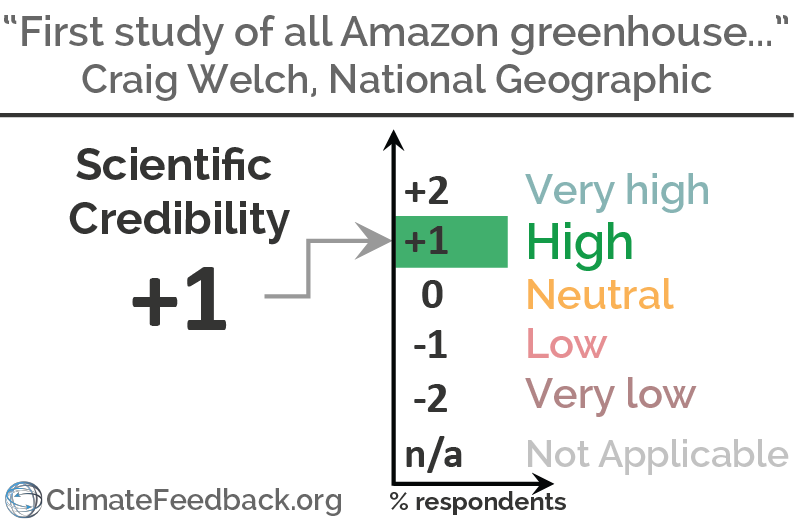
Find more details in Climate Feedback's analysis
-
-
www.nytimes.com www.nytimes.com
-
In the Atlantic Ocean, Subtle Shifts Hint at Dramatic Dangers
Overall scientific credibility: 'very high' to 'high' according to the scientists who analyzed this article.
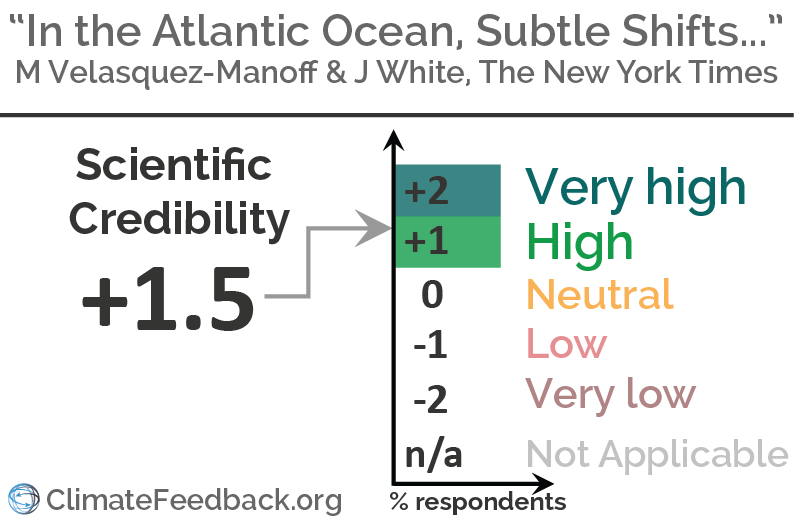
Find more details in Climate Feedback's analysis
-
- Aug 2020
-
www.nationalgeographic.com www.nationalgeographic.com
-
Why antibodies may not be the key to beating coronavirus
Overall scientific credibility: 'very high', according to scientists who analyzed this article.
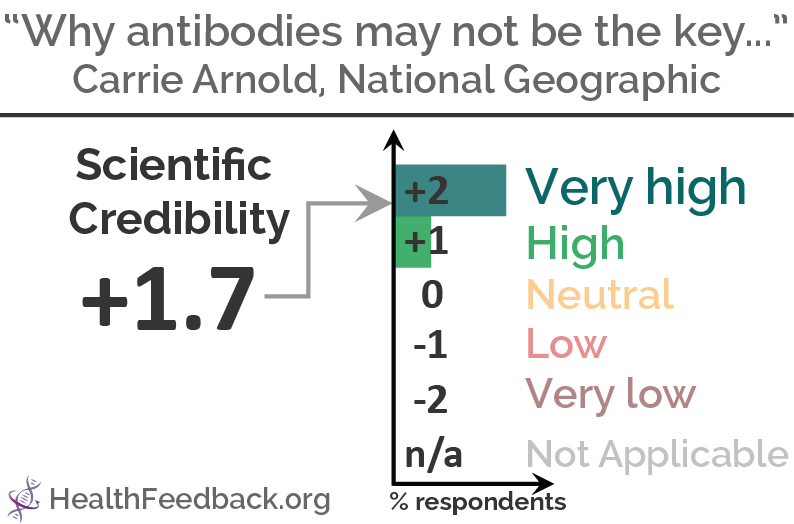
Find more details in Health Feedback's analysis
-
- Dec 2019
-
-
See how global warming has changed the world since your childhood
Overall scientific credibility: 'very high' according to the scientists who analyzed this article.
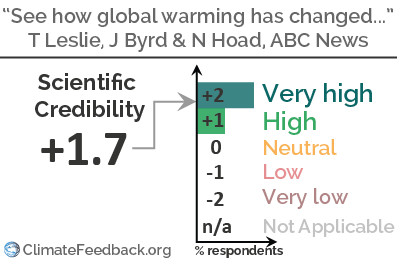
Find more details in Climate Feedback's analysis
-
- Oct 2019
-
www.dartmouth.edu www.dartmouth.edu
-
When I consider how my light is spent, E're
This line is interesting to me because it seems to have the same combination of time signatures we've seen in other Milton pieces. In one sense he is looking at how he spent all his waking hours during his life. On the other hand, this line evokes the rhythm of a day, when the sun sets in the west and darkness falls.
-
- Sep 2019
-
www.washingtonpost.com www.washingtonpost.com
-
Mystery lung illness linked to vaping. Health officials investigating nearly 100 possible cases. Add to list On my list
Overall scientific credibility: 'high', according to scientists who analyzed this article.
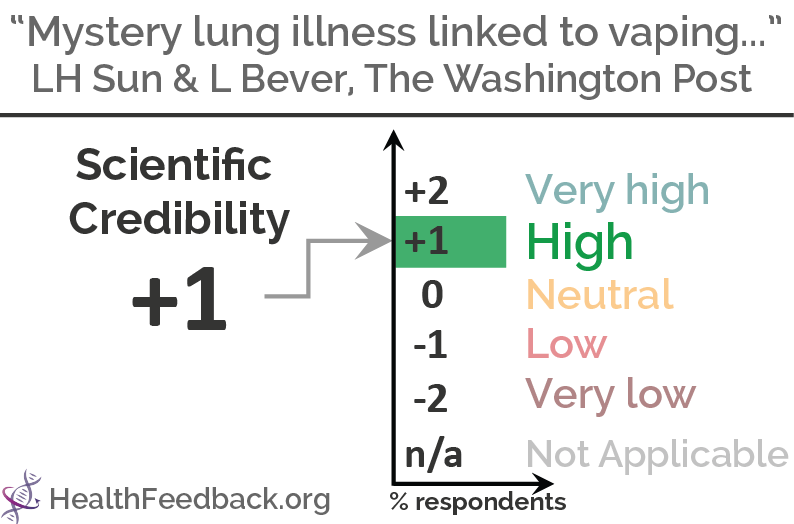
Find more details in Health Feedback's analysis
-
-
rampages.us rampages.us
-
so byinsisting that the poetic impulse could not be fulfilled unless the sexualimpulse was repressed, Milton was in effect creating an equivalence betweenthem.
This sounds very similar to how many some people today believe that as both are an act of creation, there are some similarities between writing and reproduction from a certain philosophical point of view.
-
Away with you, sleep-destroying worries' away with you'complainrs, and the squinting eye of envy with its crooked goatish look. Donot stretch your snaky f aws at me, cruel calumny' Your whole filthy gangcan do me no harm: I am not within your power. I shall stride on in safetywith an unwounded heart, lifted high above your viperous sting'
I love this particular quote. Milton's defense of his choice to become a poet instead of following a more stable and more lucrative career is kind of inspiring. Here you can see he believes so strongly in his choice that he feels he is safer than any other choice.
-
- Apr 2019
-
fsgworkinprogress.com fsgworkinprogress.com
-
Punctuation is silence—laden, rhythmic silence
Silence is a really cool tool to use in poetry. To me it is often the most powerful when used like a movie would use completely black and silent frames right after a powerful scene: it allows you to take in what you just read.
-
But we can’t gainsay the emotional meaning—sometimes corroborative, sometimes opposing—of its rhythm-sounds.
I think that a lot of people don't really properly consider the importance of how poetry sounds;like Schnackenberg says,there is an emotional meaning behind the rhythm of poetry. It can change how you perceive a certain work.
-
Mandelstam
-
- Mar 2019
-
rampages.us rampages.us
-
in propria persona.
"In his or her own person" (Google)
-
vis-2r-vis
in relation to; with regard to. (Google)
-
-
images.socialwelfare.library.vcu.edu images.socialwelfare.library.vcu.edu
-
civics with interest and thoroughness.
Here's a charming attempt to teach civics with interest:
-
to help safegyard the food, clothing and hygienic welfare of pupils
I'm reminded of some of Theodore Roosevelt's reforms around food and drugs:

-
- Jan 2019
-
www.theguardian.com www.theguardian.com
-
Huge reduction in meat-eating ‘essential’ to avoid climate breakdown
Overall scientific credibility: 'high', according to scientists who analyzed this article.
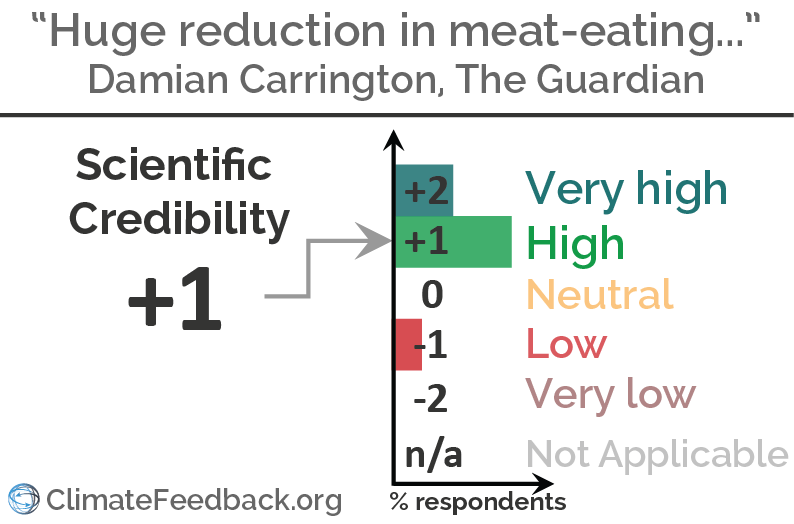
Find more details in Climate Feedback's analysis
-
- Nov 2018
-
rampages.us rampages.us
-
And now is never where the promised 6resAre burning, bur the dme that's ser aparrFor you and I to stand and sightless srare,
whats your passion? what do you love? would you let if go if you had to?
-
The future in the past is fixed forever
This is kind of hard to wrap your head around, I like it
-
Incarcerated for the way they chatter,Telling obsessively a single storyOver and over, all reduced the ruler
I really love this stanza and how the clocks are personified. They're essentially "imprisoned" due to their one function-to tell time. Also I like how clocks also give me the same kind of anxiety, they constantly tick forward, a literal constant reminder that time's arrow (oh hey Bojack Horseman) movement can't be stopped or delayed. The chatter is the ticking of the clock. The personification transforms an object so commonplace and innocuous as a clock into this ominous force of nature that's almost malicious in it's pursuit.
-
-
-
e Milton's often-quoted distinction between his poetic right hand and polemic left hand as absolute (1: 808)—as if the two hands were not part of the same body and mind, and the right hand could and did ignore what the left hand was doing or had d
This is a crucial point when looking at anyone's body of work with the intent of understanding the individual. It is easy to discard works that do not fit into your impression of Milton or that contradict his other works, but it is important to remember that all the works are still his and capture his state of mind as it was in the moment.
-
The several personifications of Truth that Milton offers in Areopagitica afford a pertinent example
I keep thinking about Areopagitica while reading Paradise Lost. I run into the intentional fallacy however, in that I shouldn't try to figure out the personality of the real author. I do believe understanding who John Milton was—how his philosophy was similar and different throughout his life can get us closer to understanding his seminal epic poem.
-
-
www.washingtonpost.com www.washingtonpost.com
-
Startling new research finds large buildup of heat in the oceans, suggesting a faster rate of global warming
Overall scientific credibility: 'high', according to scientists who analyzed this article.
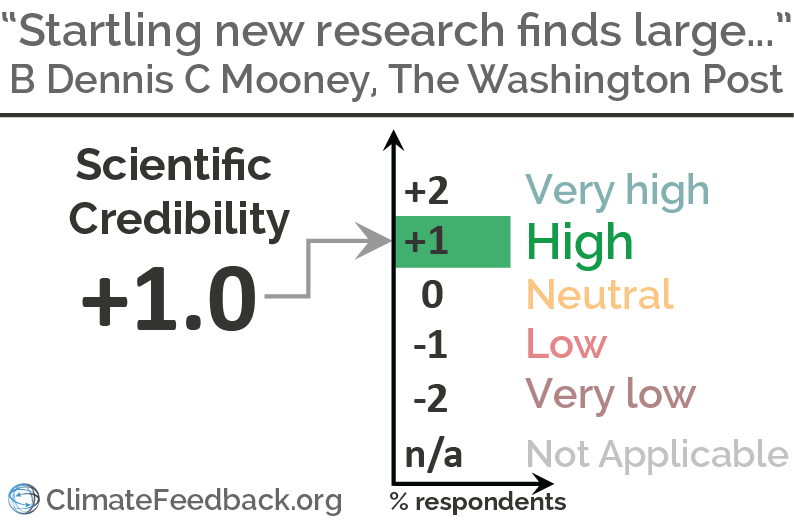
Find more details in the annotations below and in Climate Feedback's analysis
-
- Sep 2018
-
www.dartmouth.edu www.dartmouth.edu
-
began from the book of Genesis, as a prologue to his lawes; which Josephus right well hath noted. That the nation of the Jewes, reading therein the universall goodnesse of God to all creatures in the Creation, and his peculiar favour to them in his election of Abraham their ancestor, from whom they could derive so many blessings upon themselves, might be mov'd to obey sincerely by knowing so good a reason of their obedience. If then in the administration of civill justice, and under the obscurity of Ceremoniall rites, such care was had by the wisest of the heathen, and by Moses among the Jewes, to instruct them at least in a generall reason of that government to which their subjection was requir'd, how much more ought the members of the Church under the Gospell seeke to their understanding in the reason of that government which the Church claimes to have over them: especially for that the Church hath in her immediate cure those inner parts and affections of the mind where the seat of reason is; having power to examine our spirituall knowledge, and to demand from us in Gods behalfe a service intirely reasonable.
Milton draws on the biblical account of God choosing Abraham to be the father of the Jews, and when Moses was chosen to lead the Jews to the promised land while instructing them in the law that God gave them. Milton argues that if Moses instructed the Jews in a theocracy under the law, how much more is the church supposed to instruct and govern its members?
-
For there is not that thing in the world of more grave and urgent importance throughout the whole life of man, then is discipline.
This fits with what Milton seems to think is important, as evidenced with his whole argument about how people need to have a form of discipline (self-discipline) to be truly virtuous people.
-
discipline is not only the removall of disorder, but if any visible shape can be given to divine things, the very visible shape and image of vertue, whereby she is not only seene in the regular gestures and motions of her heavenly paces as she walkes, but also makes the harmony of her voice audible to mortall eares.
This rings true
-
Moses therefore the only Lawgiver that we can believe to have beene visibly taught of God, knowing how vaine it was to write lawes to men whose hearts were not first season'd with the knowledge of God
The reason why Moses was chosen to send out God's message and preach about the Ten Commandments.
-
-
rampages.us rampages.us
-
Its pou,er is that it iives on the{r:ather line between fantasy and reality. It must be neither toouood nor too bad to be true, nor may it be too true.
I hadn't thought about myths and fairytales like this before, but that's a really interesting way to look at it. I agree that they would lose a lot of impact if the balance was thrown off. There needs to be a certain amount of fantasy to balance the reality of the story. I guess people would often assume that these stories are just all fantasy but that isn't the case.
-
We know now a new origin of the faint hissingof the sea in the conch shell held to the ear.It is in part the tremor and throb of the hand,resonating in the shell's chambers. Yet, inescapably, it is thedistant sea.
I love this introduction.
-
\{yth, perhaps, serves in place of or as a fflter for experience
myth explains what cannot be explained
-
. Yet I would urge that wenot be too easily tempted into thinking that there is an oppo-sitional cpntrast between logos and mythos, the grammar ofexperieuce and the grammar of myth
I feel like so often people are so quick to make this vast distinction and difference between the two when in fact they work together in this great harmony. Too often to people put logos on a pedestal and therefore only understand half of what they are looking at.
-
iris is thc myth of happincss as innocence, and in ther llrristian traclition we know it as Man beforc the Fall' Inno-, , n('t: ends either by a succcssful attempt to steal the knorvl-, ' irr,r' of God or by aspiring to thc cognitive power of the gods'l,,tlt,ris
Drawing parallels between Greek mythology and Christianity is interesting to me because I always like learning about the similarities in religions and how they all seem to bounce off of one another and makes me wonder what they all originated from in the very beginning. Some of the common themes are much too similar to not have been drawn from an originator.
-
Its pou,er is that it iives on the{r:ather line between fantasy and reality.
I like this description of a boundary
-
-
www.gardnercampbell.net www.gardnercampbell.net
-
We are not only innocent, but alsoguilty; not only strong but weak; not only mutually entwined butirrevocably sundered; we are not only minds, but bodies; not onlywholes but fragrnents; not only energy but form.
This shows the duality of ones personality and I like how she talks about this, as often in some myths/stories we are shown only one side of a characters personality and they're made out to be only one way. I like how this brings about the fluidity of personality and ones "self" #Insightful
-
- Aug 2018
-
www.theguardian.com www.theguardian.com
-
Arctic’s strongest sea ice breaks up for first time on record
Overall scientific credibility: 'high', according to scientists who analyzed this article.
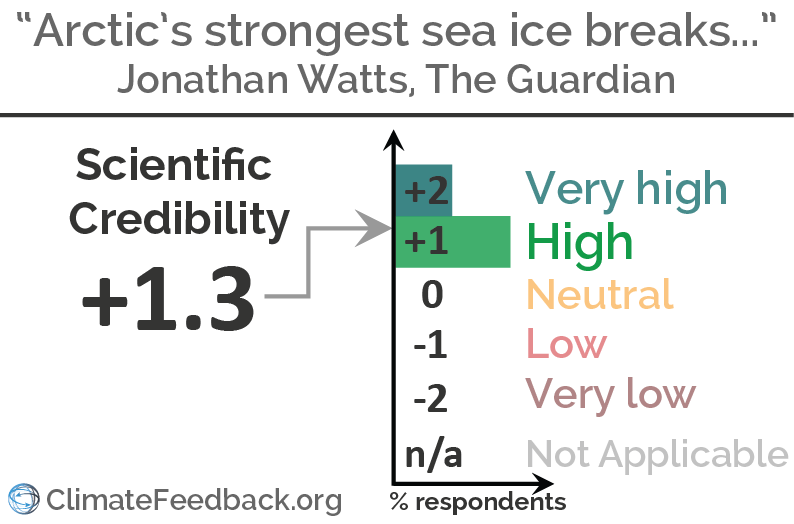
Find more details in the annotations below and in Climate Feedback's analysis
-
-
www.theguardian.com www.theguardian.com
-
Domino-effect of climate events could move Earth into a ‘hothouse’ state
Overall scientific credibility: 'high', according to scientists who analyzed this article.
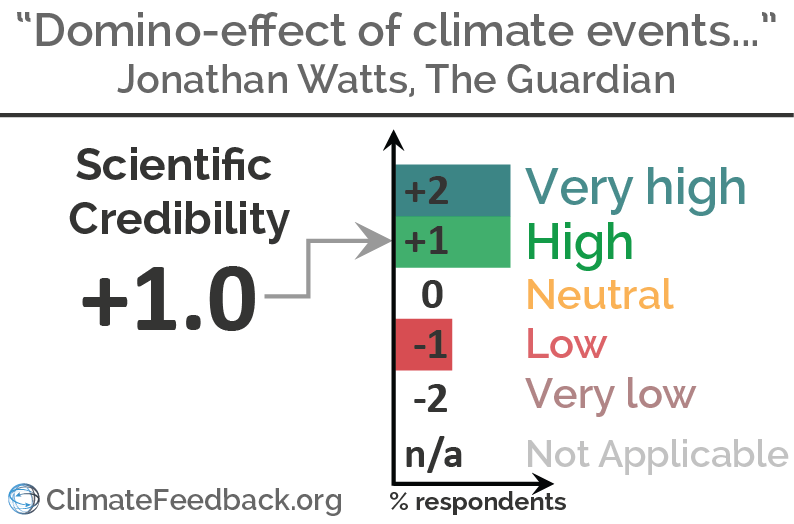
Find more details in the annotations below and in Climate Feedback's analysis
-
- Jun 2018
-
www.washingtonpost.com www.washingtonpost.com
-
Antarctic ice loss has tripled in a decade. If that continues, we are in serious trouble.
Overall scientific credibility: 'high', according to scientists who analyzed this article.
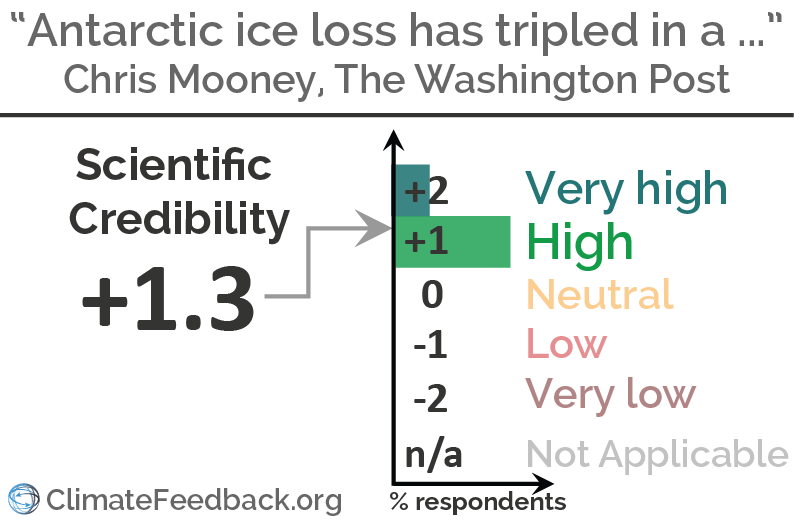
Find more details in the annotations below and in Climate Feedback's analysis
-
-
news.nationalgeographic.com news.nationalgeographic.com
-
Hurricanes Are Moving Slower—And That's a Huge Problem
Overall scientific credibility: 'very high', according to scientists who analyzed this article.
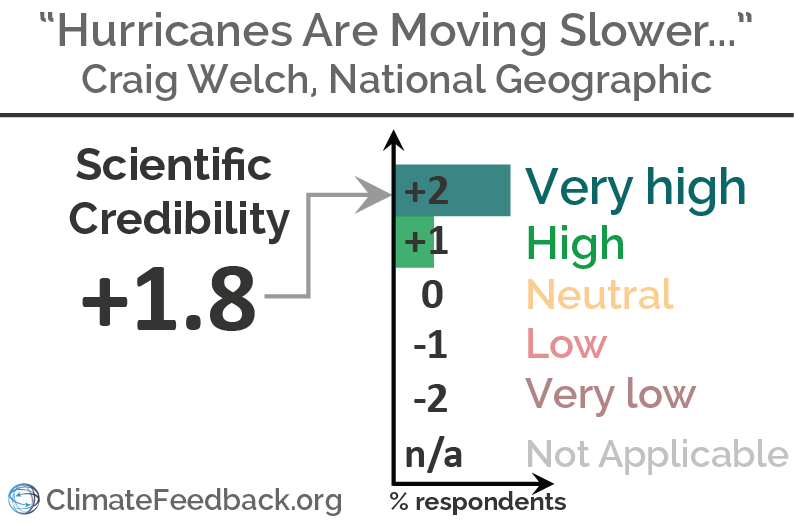
Find more details in the annotations below and in Climate Feedback's analysis
-
- Mar 2018
-
www.washingtonpost.com www.washingtonpost.com
-
The Arctic’s carbon bomb might be even more potent than we thought
Overall scientific credibility: 'very high', according to scientists who analyzed this article.
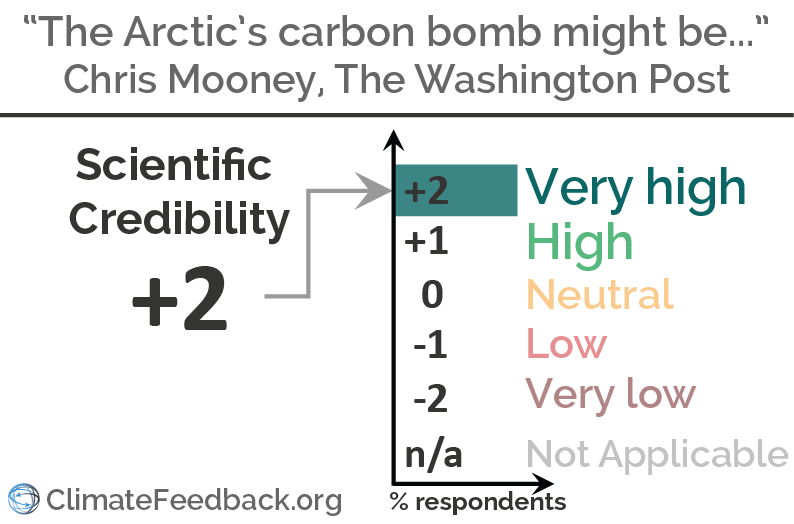
Find more details in the annotations below and in Climate Feedback's analysis
-
- Jan 2018
-
www.nytimes.com www.nytimes.com
-
An Iceberg the Size of DelawareJust Broke Away From Antarctica
Overall scientific credibility: 'very high', according to scientists who analyzed this article.
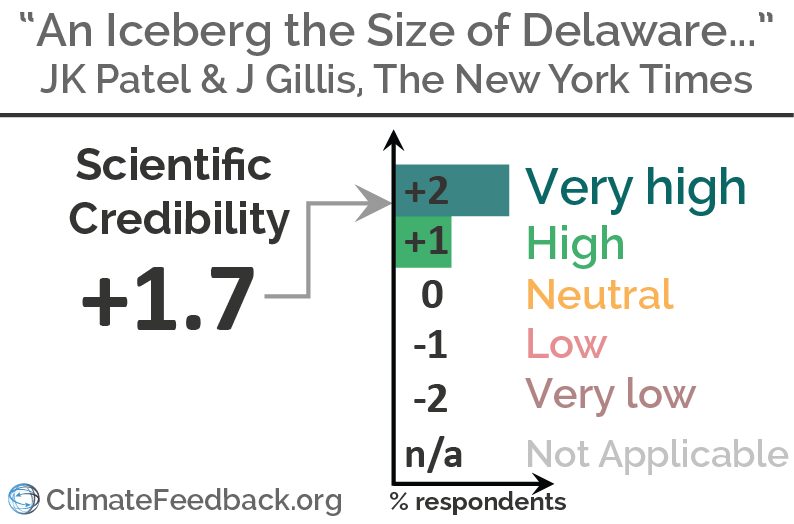
Find more details in the annotations below and in Climate Feedback's analysis
-
-
www.nytimes.com www.nytimes.com
-
Arctic’s Winter Sea Ice Drops to Its Lowest Recorded Level
Overall scientific credibility: 'high', according to scientists who analyzed this article.
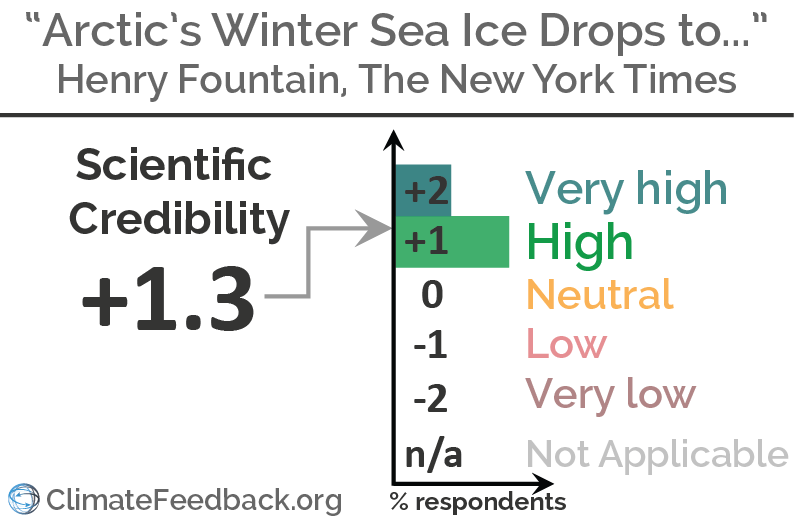
Find more details in the annotations below and in Climate Feedback's analysis
-
-
www.nytimes.com www.nytimes.com
-
Earth Sets a Temperature Record for the Third Straight Year
Overall scientific credibility: 'very high', according to scientists who analyzed this article.
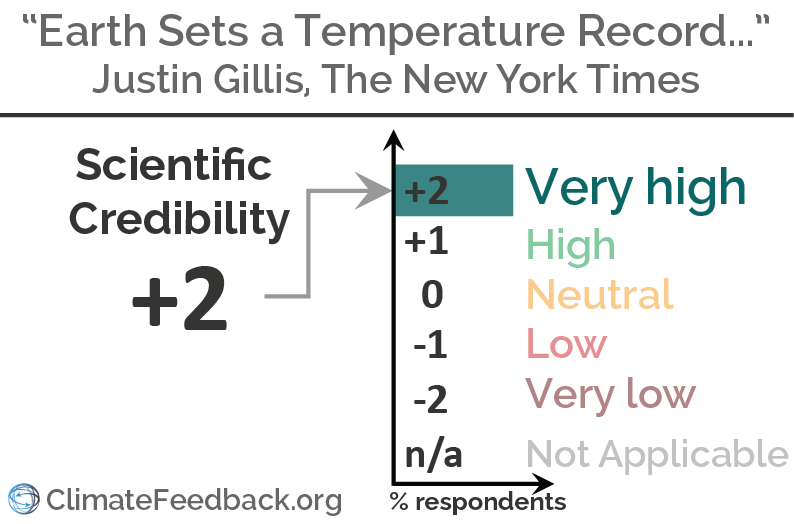
Find more details in the annotations below and in Climate Feedback's analysis
-
- Nov 2017
-
-
Ice Apocalypse
Overall scientific credibility: 'high', according to scientists who analyzed this article.
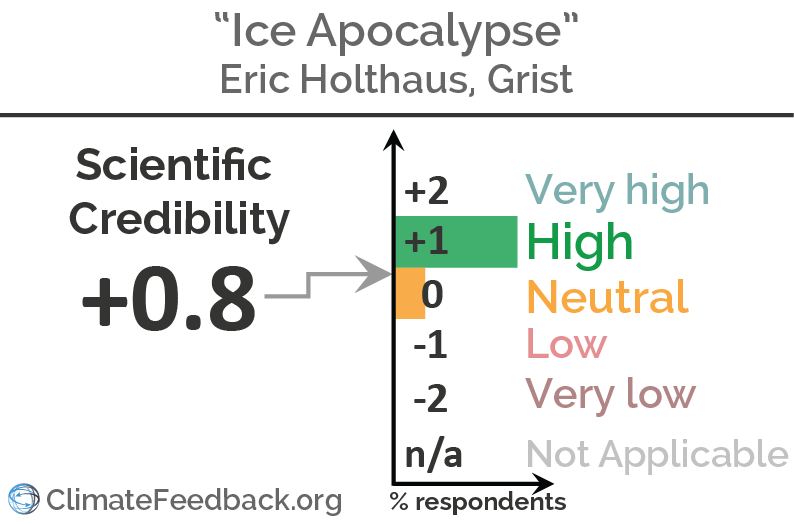
Find more details in the annotations below and in Climate Feedback's analysis
-
-
www.theguardian.com www.theguardian.com
-
The three-degree world: the cities that will be drowned by global warming
Overall scientific credibility: 'mixed', according to scientists who analyzed this article.
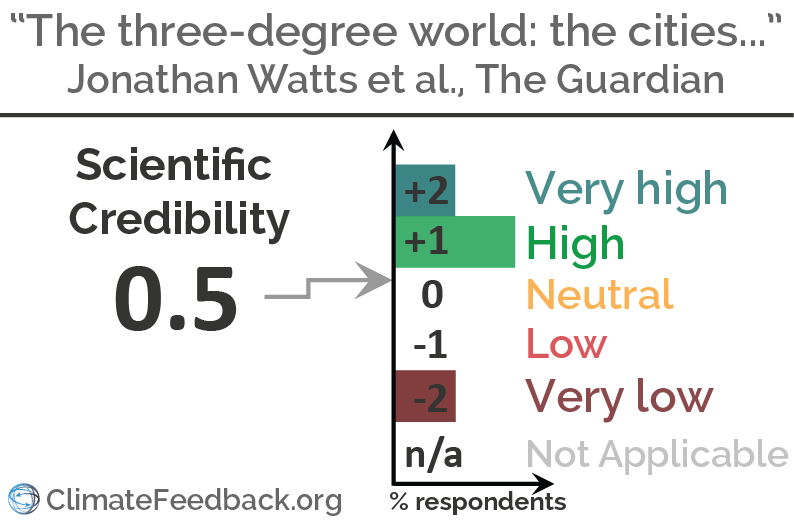
Find more details in the annotations below and in Climate Feedback's analysis
-
- Sep 2017
-
www.theatlantic.com www.theatlantic.com
-
Has Climate Change Intensified 2017’s Western Wildfires?
Overall scientific credibility: 'very high', according to scientists who analyzed this article.
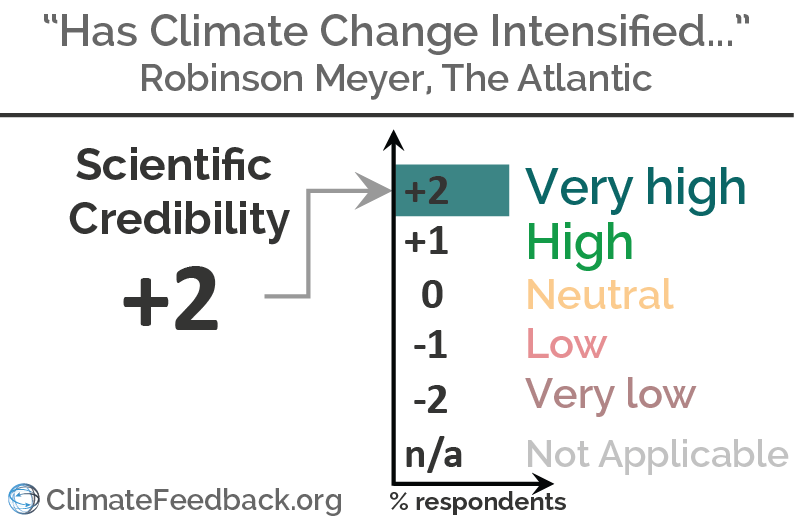
Find more details in the annotations below and in Climate Feedback's analysis
-
- Aug 2017
-
www.theatlantic.com www.theatlantic.com
-
Did Climate Change Intensify Hurricane Harvey?
Overall scientific credibility: 'high' to 'very high', according to scientists who analyzed this article.
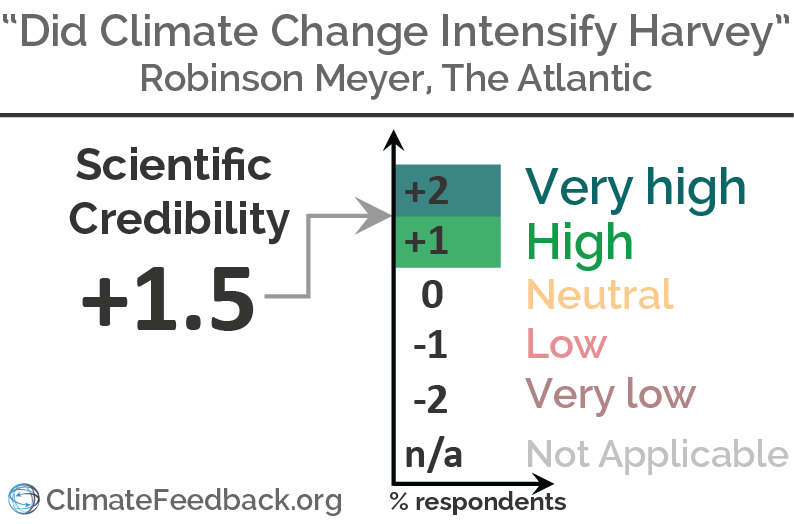
Find more details in the annotations below and in Climate Feedback's analysis
-
-
www.nytimes.com www.nytimes.com
-
Alaska’s PermafrostIs Thawing
Overall scientific credibility: 'high' to 'very high', according to scientists who analyzed this article.
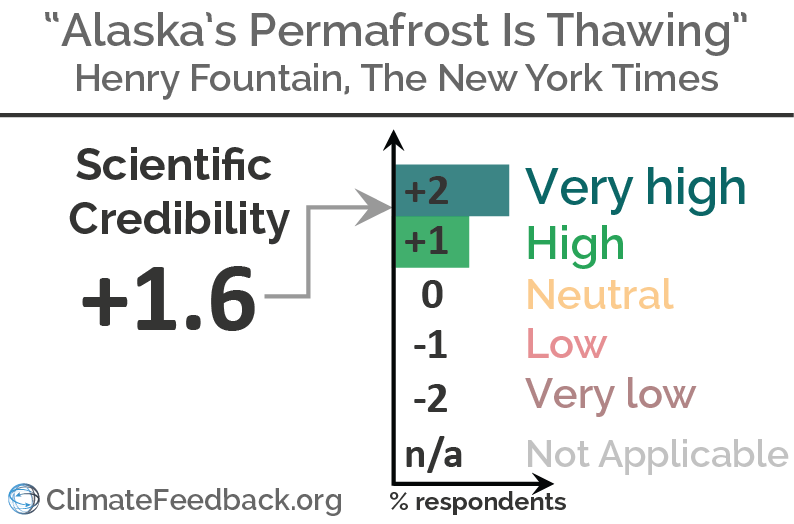
Find more details in the annotations below and in Climate Feedback's analysis
-
- May 2017
-
www.nytimes.com www.nytimes.com
-
Racing to Find Answers in the Ice
Overall scientific credibility: 'high' to 'very high', according to 9 scientists who analyzed this article.
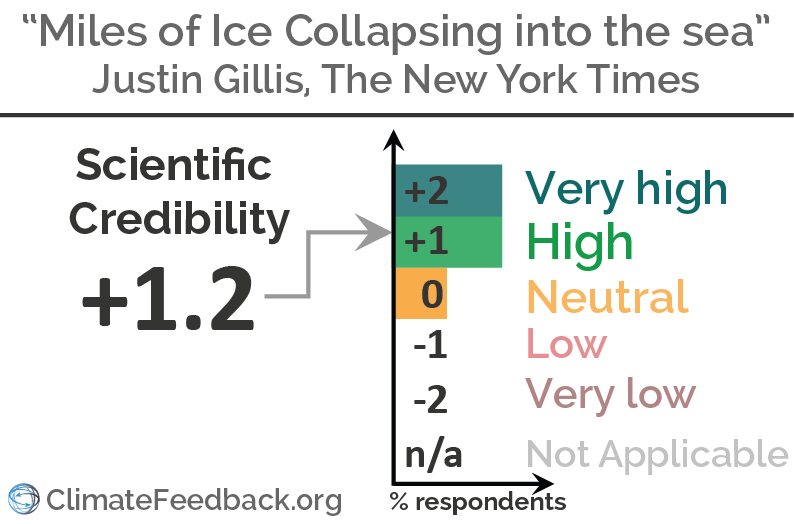
Find more details in the annotations below and in Climate Feedback's analysis
-
- Apr 2017
-
www.bloomberg.com www.bloomberg.com
-
How a Melting Arctic Changes Everything
Overall scientific credibility: 'very high', according to 5 scientists who analyzed this article.
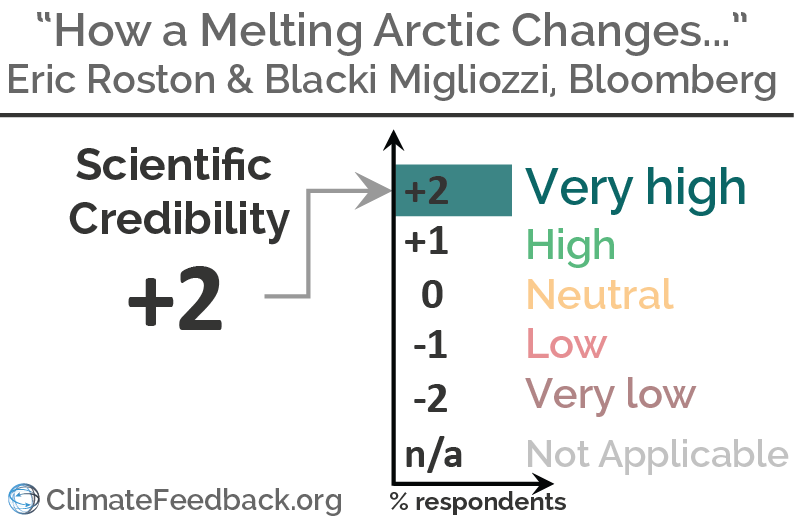
Find more details in the annotations below and in Climate Feedback's analysis
Tags
Annotators
URL
-
- Mar 2017
-
www.washingtonpost.com www.washingtonpost.com
-
One of the most troubling ideas about climate change just found new evidence in its favor
Overall scientific credibility: 'high', according to 6 scientists who analyzed this article.
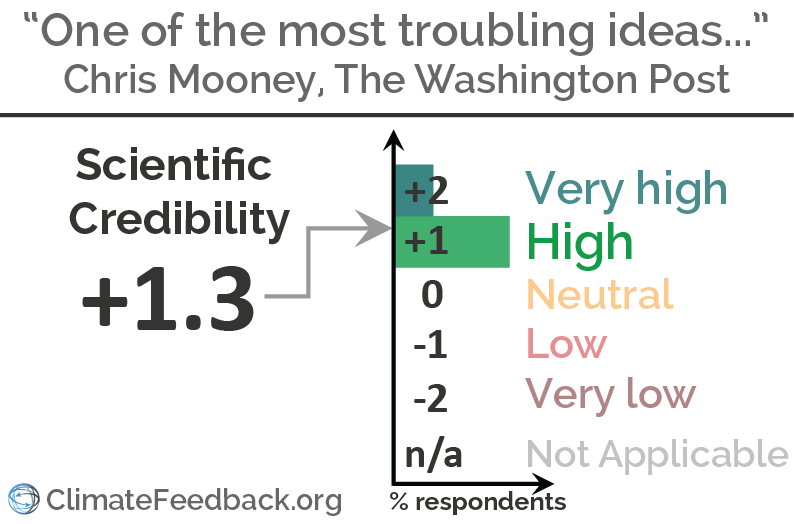
Find more details in the annotations below and in Climate Feedback's analysis
-
- Feb 2017
-
-
Here’s why it's so frickin’ hot right now window.variationsTitleElem = $('article header h1.title');
Overall scientific credibility: 'high', according to 3 scientists who analyzed this article.
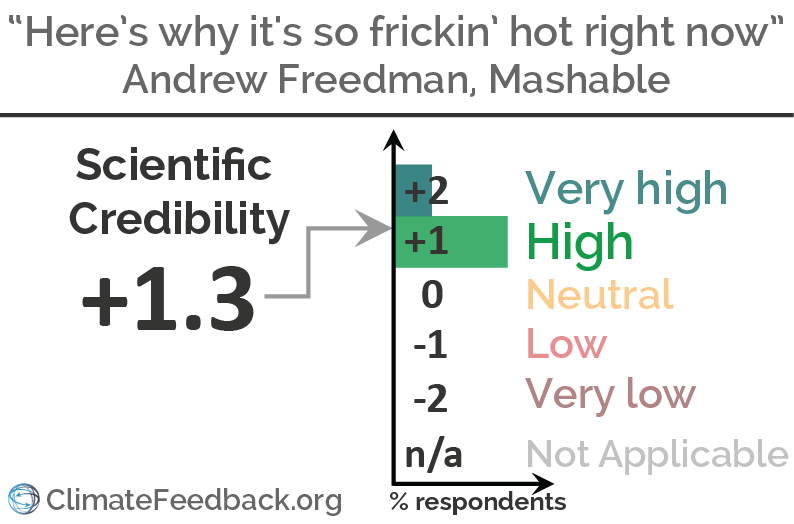
Find more details in the annotations below and in Climate Feedback's analysis
-
-
-
El Niño, explained: Why this year's could be one of the strongest on record
Overall scientific credibility: 'very high' to 'high', according to 5 scientists who analyzed this article.
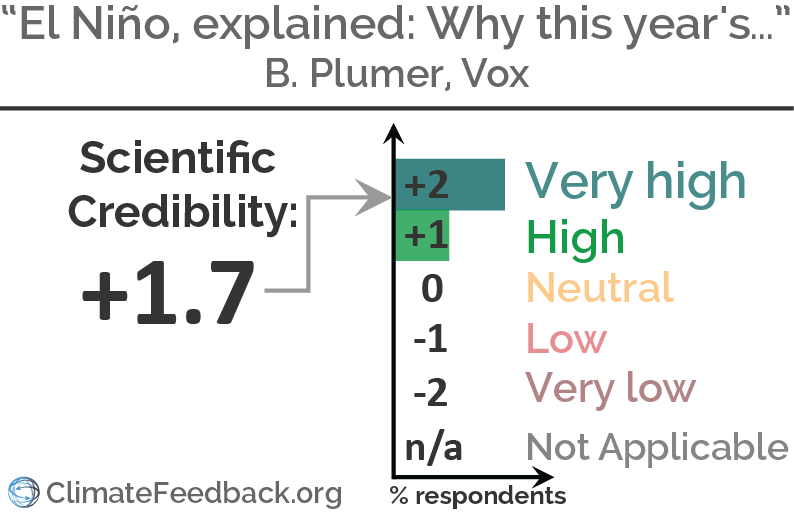
Find more details in the reply+annotations below and in Climate Feedback's analysis
-
-
www.washingtonpost.com www.washingtonpost.com
-
Scientists have just detected a major change to the Earth’s oceans linked to a warming climate The inside track on Washington politics. Be the first to know about new stories from PowerPost. Sign up to follow, and we’ll e-mail you free updates as they’re published. You’ll receive free e-mail news updates each time a new story is published. You’re all set! Sign up *Invalid email address Got it Got it
Overall scientific credibility: 'very high', according to 6 scientists who analyzed this article.
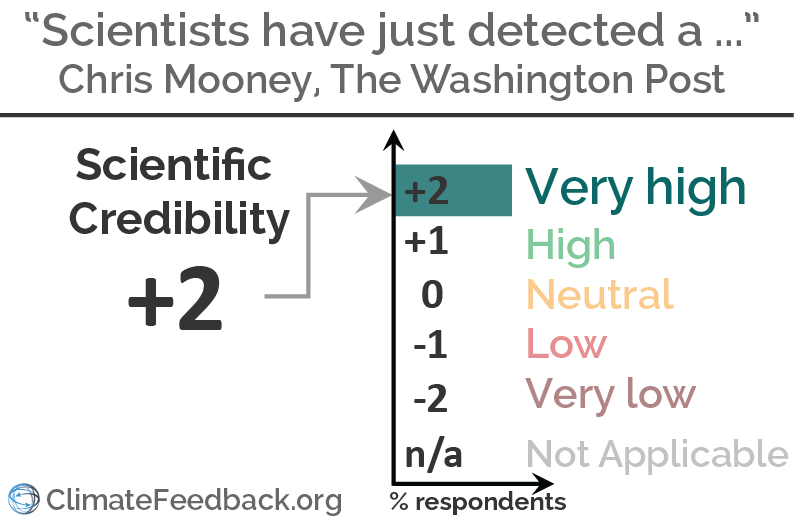
Find more details in the annotations below and in Climate Feedback's analysis
-
- Jan 2017
-
www.washingtonpost.com www.washingtonpost.com
-
U.S. scientists officially declare 2016 the hottest year on record. That makes three in a row. The inside track on Washington politics. Be the first to know about new stories from PowerPost. Sign up to follow, and we’ll e-mail you free updates as they’re published. You’ll receive free e-mail news updates each time a new story is published. You’re all set! Sign up *Invalid email address Got it Got it
Overall scientific credibility: 'very high', according to 12 scientists who analyzed this article.
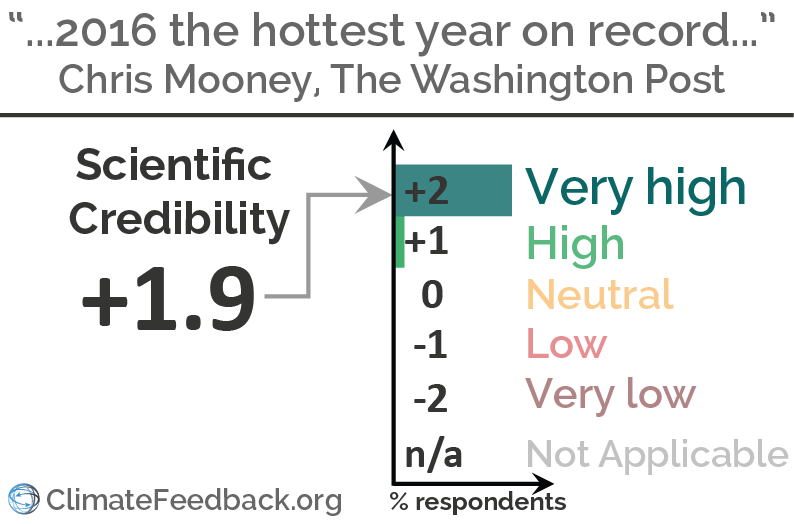
Find more details in the annotations below and in Climate Feedback's analysis
-
- Dec 2016
-
www.theguardian.com www.theguardian.com
-
Arctic ice melt 'already affecting weather patterns where you live right now'
Overall scientific credibility: 'neutral' to 'high', according to 6 scientists who analyzed this article.
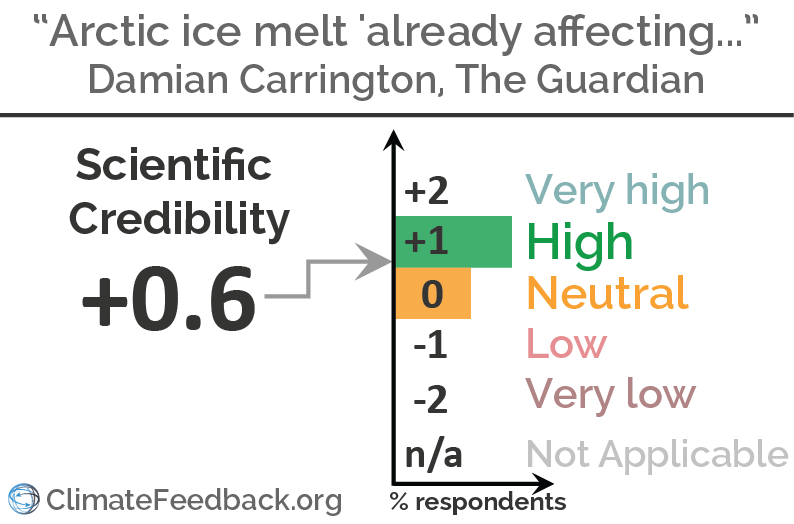
Find more details in the annotations below and in Climate Feedback's analysis
-
-
www.cnn.com www.cnn.com
-
Amid higher global temperatures, sea ice at record lows at poles
Overall scientific credibility: 'very high', according to 5 scientists who analyzed this article.
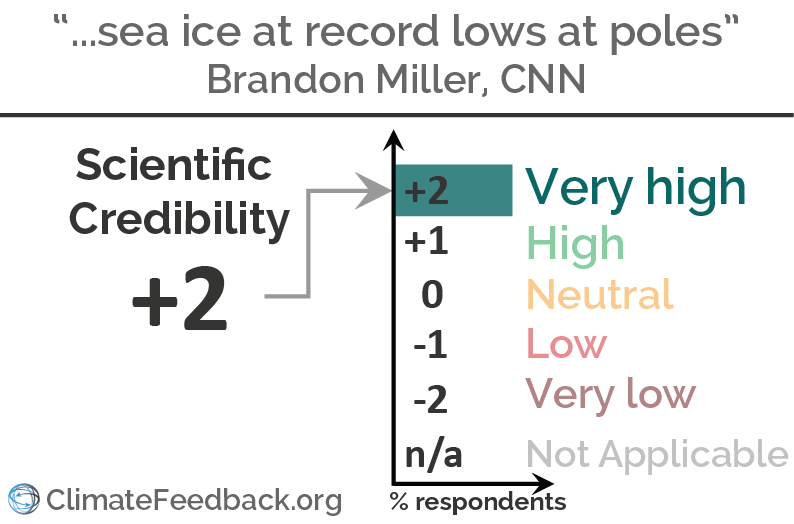
Find more details in the annotations below and in Climate Feedback's analysis
-
- Sep 2016
-
www.theguardian.com www.theguardian.com
-
Greenland's huge annual ice loss is even worse than thought
Overall scientific credibility: 'very high', according to 7 scientists who analyzed this article.
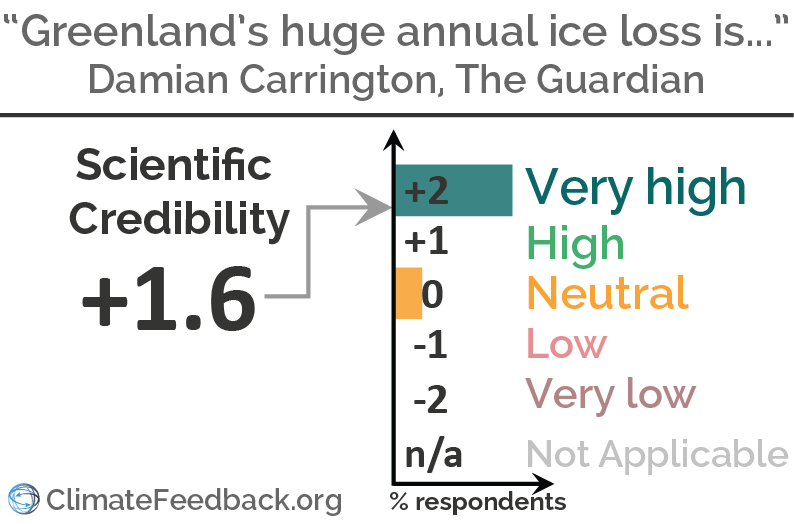
Find more details in the annotations below and in Climate Feedback's analysis
-
-
-
Flooding of Coast,Caused by Global Warming,Has Already Begun
Overall scientific credibility: 'very high', according to 12 scientists who analyzed this article.
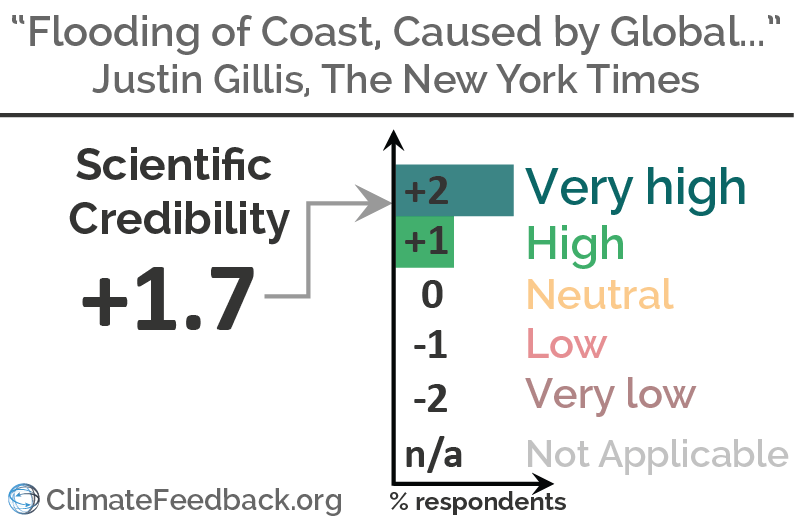
Find more details in the annotations below and in Climate Feedback's analysis
-
- Aug 2016
-
www.theguardian.com www.theguardian.com
-
Environmental records shattered as climate change 'plays out before us'
Overall scientific credibility: 'high', according to the 8 scientists who analyzed this article.
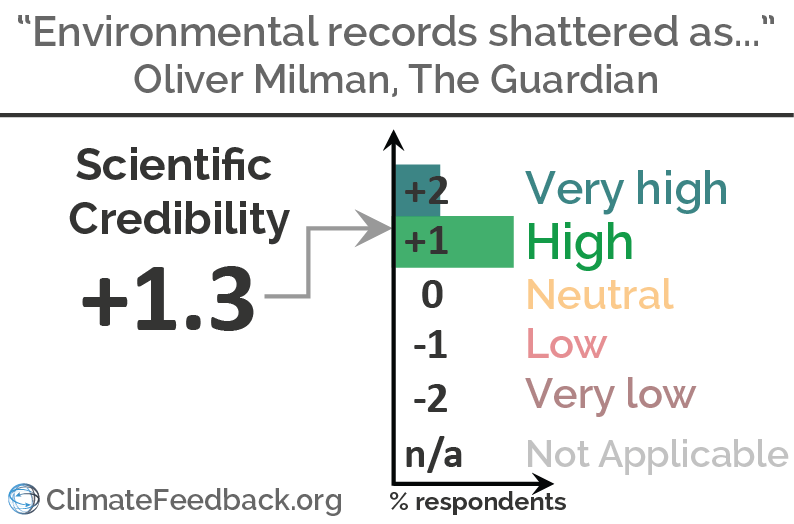
Find more details in the annotations below and in Climate Feedback's analysis
-
- Mar 2016
-
www.washingtonpost.com www.washingtonpost.com
-
What we’re doing to the Earth has no parallel in 66 million years, scientists say The inside track on Washington politics. Be the first to know about new stories from PowerPost. Sign up to follow, and we’ll e-mail you free updates as they’re published. You’ll receive free e-mail news updates each time a new story is published. You’re all set! Sign up *Invalid email address Got it Got it .hideText{position:absolute;left:-10000px}
Overall scientific credibility: 'very high' to 'high', according to 7 scientists who analyzed this article.
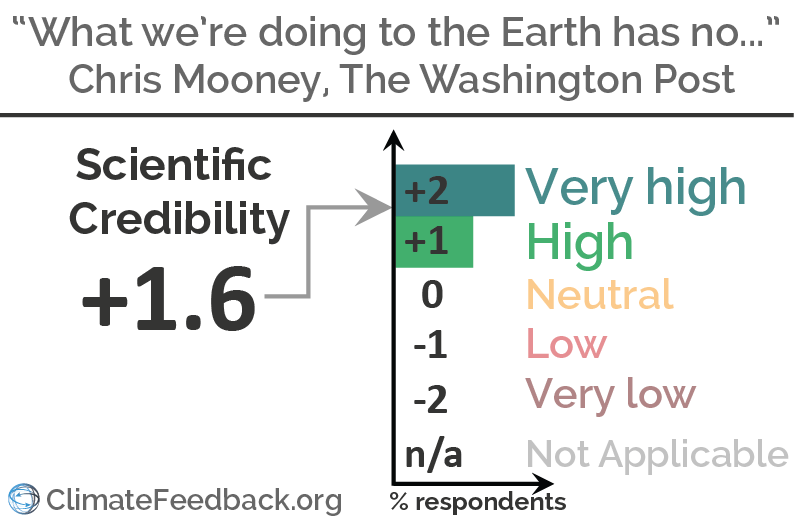
Find more details in the reply+annotations below and in Climate Feedback's analysis
-
-
www.theguardian.com www.theguardian.com
-
Overall scientific credibility: 'neutral', according to 6 scientists who analyzed this article.

Find more details in the reply+annotations below and in Biotech Feedback's analysis
-
- Feb 2016
-
www.nytimes.com www.nytimes.com
-
Seas Are Rising at Fastest Rate in Last 28 Centuries
Overall scientific credibility: 'very high' to 'high', according to 7 scientists who analyzed this article.
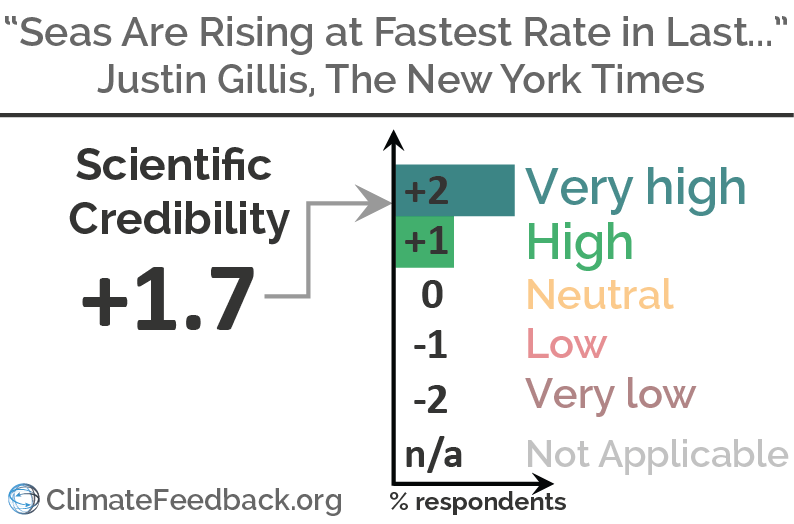
Find more details in the reply+annotations below and in Climate Feedback's analysis
-
- Jan 2016
-
www.nytimes.com www.nytimes.com
-
2015 Was Hottest Year in Historical Record, Scientists Say
Overall scientific credibility: 'very high', according to 8 scientists who analyzed this article.
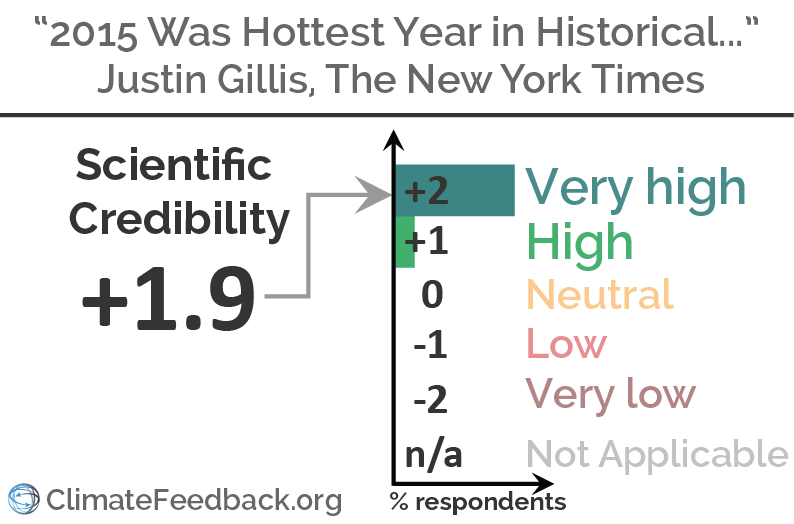
Find more details in the reply+annotations below and in Climate Feedback's analysis
-
-
www.washingtonpost.com www.washingtonpost.com
-
Scientists say human greenhouse gas emissions have canceled the next ice age
Overall scientific credibility: 'very high', according to 8 scientists who analyzed this article.
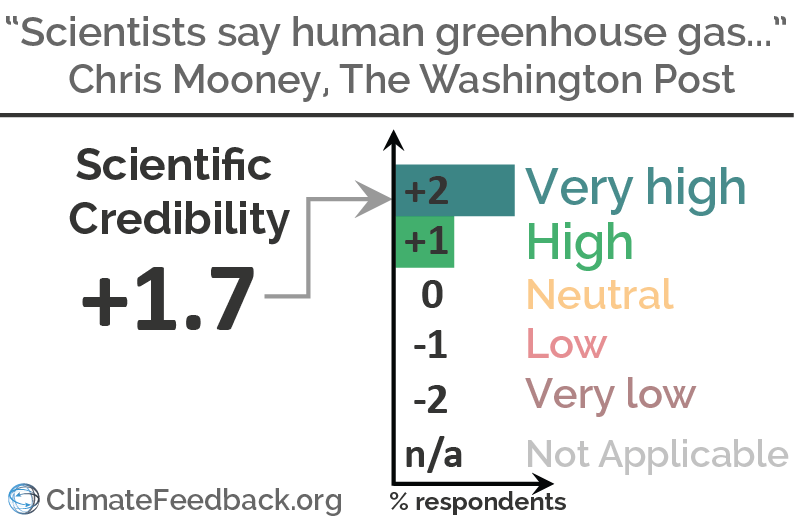
Find more details in the reply+annotations below and in Climate Feedback's analysis
-
- Oct 2015
-
www.theguardian.com www.theguardian.com
-
A technology can’t itself be good or evil – the real issue is in how it is applied.
-
-
-
South Carolina flooding is the type of event climate scientists have warned about for years
Overall scientific credibility: 'high', according to 6 scientists who analyzed this article.
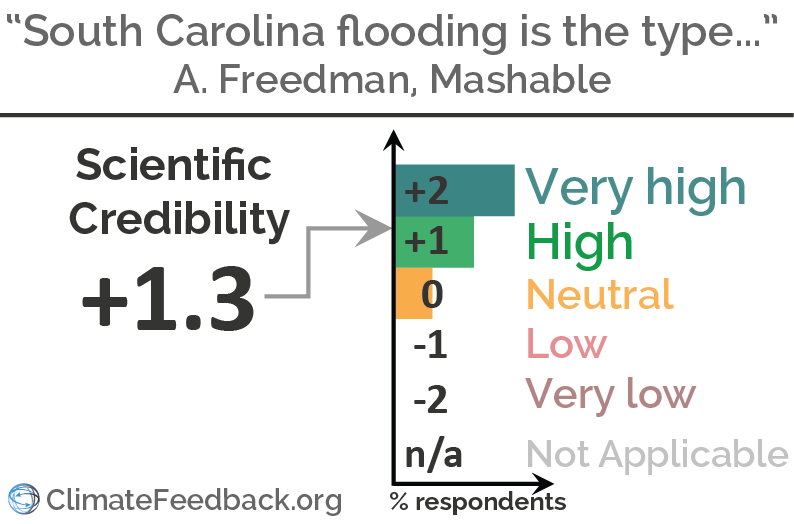
Find more details in the reply+annotations below and in Climate Feedback's analysis
-
- May 2015
-
app.immersivetranslate.com app.immersivetranslate.com
-
Vanuatu's president makes a leap in tying Cyclone Pam to climate change
Overall scientific credibility: 'very high' to 'high', according to the 6 climate scientists who analyzed this article.

Find more details in the reply+annotations below and in ClimateFeedback's analysis featuring contributions by Brian Soden and Greg Holland
-
- Jan 2015
-
www.nytimes.com www.nytimes.com
-
2014 Breaks Heat Record
Overall scientific credibility: 'high' to 'very high', according to 8 climate scientists who evaluated this article.

Find more details in the annotations below and here
jgdwyer:
This article accurately describes global warming and puts the news that 2014 is the hottest year on record into appropriate context. The article does a very good job of distinguishing between climate variability and climate change with helpful discussion on ENSO and the relatively cold temperatures in the Eastern United States (while staying within the bounds of the mainstream climate science understanding).
karmour:
Very good article overall. I do wish the author had fact checked the incorrect claim by Dr. Christy (that global temperatures have not changed since the end of the 20th century) prior to including his quote in the article.
aklocker:
Scientifically this article seems to be correct but it could be a bit more precise in some of its statements. One thing I like is that it mentions different opinions on some points where scientists do not agree rather than giving a biased story.
bmv:
This article does a good job of putting the 2014 temperature record in context with quotes from experts and good descriptions of relevant issues such as El Nino. References to "skeptics" were appropriately followed up by evidence of their misinterpretation/mischaracterization of the data.
aalpert:
This article provides an accurate and well supported evaluation of the finding that 2014 was the hottest year on record.
emvincent:
Overall, this article is fair in its representation of the 2014 temperature record event and in reminding the context of the long-term warming trend+natural climate variability.
alexis.tantet:
The quality of this article is overall higher than most newspaper articles on climate change as it avoids the usual pitfalls such as confusing year to year variability with long-term change. It also addresses issues prone to confusion, such as why eastern USA did not experience such a warm year as most of the globe, which can help the readers to put the science in perspective with the seasonal climate they have actually experienced. The fact that the article focuses mostly on the observational record and not on theoretical or modeling studies may be a weakness, but the scope of an article cannot be too broad.
-